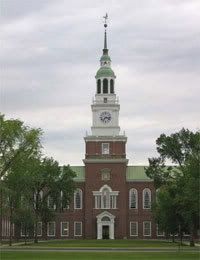Right wing takeover at Dartmouth?
 Daily Kos had a post yesterday describing an unsettling move by folks on the far-right to reassert themselves on a campus only now starting to recover from its history as a right-wing institution. The jist:
Daily Kos had a post yesterday describing an unsettling move by folks on the far-right to reassert themselves on a campus only now starting to recover from its history as a right-wing institution. The jist:
Here's the deal: Dartmouth has an unusually small board of trustees, with half the trustees historically elected by the alumni. In recent years, a group of alums has organized to elect hard right trustees, with the intent of rolling back two decades of Dartmouth's movement away from its infamously conservative past. Because the board of trustees is so small, it is vulnerable to the election of just a few people. (By way of comparison, Colgate University, with 2,750 students, has 34 trustees, while Dartmouth, with 4,100 students, has 18.)
When the college acted to make a full takeover of the board more difficult by expanding its size, the conservative-controlled Association of Alumni sued the college, supported by outside conservative groups. Now, the AoA is about to begin its elections, and the VRWC is continuing its mission to take over Dartmouth's alumni governance, continue the lawsuit, and influence the course of the college for generations.
Thankfully, those who don't have carboard cutouts of Bill O'Reilly in their bedrooms have banded together to counter this attempted takeover. They've got a slate of their own (and it's hardly a hippie slate at that), and a website at: http://www.dartmouthundying.com/
This is something you should be talking to with friends and family you know who currently or formerly went to Dartmouth College. Even if they're not "progressive," I think if you lay out exactly how horrid these right-wing candidates are (as the Daily Kos post does so well), they'll be willing to help. The DKos post also describes the involvement of right-wing groups like ACTA (American Council of Trustees and Alumni) and FIRE (Foundation for Individual Rights in Education). While I've posted favorably on a bit of FIRE's work in the past, looking at all their other work paints a clear picture of how harmful the group is.
As dangerous as this threat may be, it's better than most colleges and universities, where Trustees are entirely self-selecting (i.e. the current Board members get to pick new Board members). Democratizing Boards of Trustees is a crucial battle we need to be fighting, but we should be democratizing it toward students, faculty and staff, not alums. And ultimately, we should be devolving power from them to directly democratic, participatory institutions on campus.